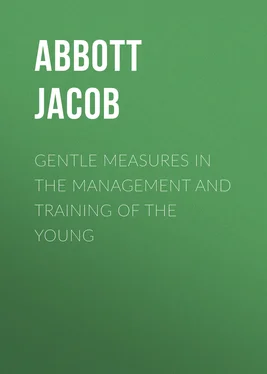Jacob Abbott - Gentle Measures in the Management and Training of the Young
Здесь есть возможность читать онлайн «Jacob Abbott - Gentle Measures in the Management and Training of the Young» — ознакомительный отрывок электронной книги совершенно бесплатно, а после прочтения отрывка купить полную версию. В некоторых случаях можно слушать аудио, скачать через торрент в формате fb2 и присутствует краткое содержание. Жанр: foreign_edu, pedagogy_book, upbringing_book, на английском языке. Описание произведения, (предисловие) а так же отзывы посетителей доступны на портале библиотеки ЛибКат.
- Название:Gentle Measures in the Management and Training of the Young
- Автор:
- Жанр:
- Год:неизвестен
- ISBN:нет данных
- Рейтинг книги:5 / 5. Голосов: 1
-
Избранное:Добавить в избранное
- Отзывы:
-
Ваша оценка:
- 100
- 1
- 2
- 3
- 4
- 5
Gentle Measures in the Management and Training of the Young: краткое содержание, описание и аннотация
Предлагаем к чтению аннотацию, описание, краткое содержание или предисловие (зависит от того, что написал сам автор книги «Gentle Measures in the Management and Training of the Young»). Если вы не нашли необходимую информацию о книге — напишите в комментариях, мы постараемся отыскать её.
Gentle Measures in the Management and Training of the Young — читать онлайн ознакомительный отрывок
Ниже представлен текст книги, разбитый по страницам. Система сохранения места последней прочитанной страницы, позволяет с удобством читать онлайн бесплатно книгу «Gentle Measures in the Management and Training of the Young», без необходимости каждый раз заново искать на чём Вы остановились. Поставьте закладку, и сможете в любой момент перейти на страницу, на которой закончили чтение.
Интервал:
Закладка:
After Egbert had gone to bed, and before he went to sleep, George made him a visit at his bedside, and, after a little playful frolic with him, to put him in special good-humor, said he would make his explanation.
"The reason why I had to give up the fishing expedition," he said, "was, I found that I could not depend upon your obeying me."
Egbert, after a moment's pause, said that he did not disobey him; and when George reminded him of his taking the path that he was forbidden to take, and of his crossing the log bridge against orders, he said that that path led to the river by the shortest way, and that he knew that the log was firm and steady, and that he could go over it without falling in. "And so you thought you had good reasons for disobeying me," rejoined George. "Yes," said Egbert, triumphantly. "That is just it," said George. "You are willing to obey, except when you think you have good reasons for disobeying, and then you disobey. That's the way a great many boys do, and that reminds me of the story I was going to tell you. It is about some soldiers."
George then told Egbert a long story about a colonel who sent a captain with a company of men on a secret expedition with specific orders, and the captain disobeyed the orders and crossed a stream with his force, when he had been directed to remain on the hither side of it, thinking himself that it would be better to cross, and in consequence of it he and all his force were captured by the enemy, who were lying in ambush near by, as the colonel knew, though the captain did not know it. George concluded his story with some very forcible remarks, showing, in a manner adapted to Egbert's state of mental development, how essential it was to the character of a good soldier that he should obey implicitly all the commands of his superior, without ever presuming to disregard them on the ground of his seeing good reason for doing so.
He then went on to relate another story of an officer on whom the general could rely for implicit and unhesitating obedience to all his commands, and who was sent on an important expedition with orders, the reasons for which he did not understand, but all of which he promptly obeyed, and thus brought the expedition to a successful conclusion. He made the story interesting to Egbert by narrating many details of a character adapted to Egbert's comprehension, and at the end drew a moral from it for his instruction.
This moral was not, as some readers might perhaps anticipate, and as, indeed, many persons of less tact might have made it, that Egbert ought himself, as a boy, to obey those in authority over him. Instead of this he closed by saying: "And I advise you, if you grow up to be a man and ever become the general of an army, never to trust any captain or colonel with the charge of an important enterprise, unless they are men that know how to obey." Egbert answered very gravely that he was "determined that he wouldn't."
Soon after this George bade him good-night and went away. The next day he told Egbert not to be discouraged at his not having yet learned to obey. "There are a great many boys older than you," he said, "who have not learned this lesson; but you will learn in time. I can't go a-fishing with you, or undertake any other great expeditions, till I find I can trust you entirely to do exactly as I say in cases where I have a right to decide; but you will learn before long, and then we can do a great many things together which we can not do now."
Any one who has any proper understanding of the workings of the juvenile mind will see that George, by managing Egbert on these principles, would in a short time acquire complete ascendency over him, while the boy would very probably remain, in relation to his mother, as disobedient and insubordinate as ever. If the penalty annexed to the transgression is made as much as possible the necessary and natural consequence of it, and is insisted upon calmly, deliberately, and with inflexible decision, but without irritation, without reproaches, almost without any indications even of displeasure, but is, on the contrary, lightened as much as possible by sympathy and kindness, and by taking the most indulgent views, and admitting the most palliating considerations in respect to the nature of the offense, the result will certainly be the establishment of the authority of the parent or guardian on a firm and permanent basis.
There are a great many cases of this kind, where a child with confirmed habits of insubordination comes under the charge of a person who is not responsible for the formation of these habits. Even the mother herself sometimes finds herself in substantially this position with her own children; as, for example, when after some years of lax and inefficient government she becomes convinced that her management has been wrong, and that it threatens to bring forth bitter fruits unless it is reformed. In these cases, although the work is somewhat more difficult, the principles on which success depends are the same. Slight penalties, firmly, decisively, and invariably enforced—without violence, without scolding, without any manifestation of resentment or anger, and, except in extreme cases, without even expressions of displeasure—constitute a system which, if carried out calmly, but with firmness and decision, will assuredly succeed.
The case would thus seem to be very simple, and success very easy. But, alas! this is far from being the case. Nothing is required, it is true, but firmness, steadiness, and decision; but, unfortunately, these are the very requisites which, of all others, it seems most difficult for mothers to command. They can not govern their children because they can not govern themselves.
Still, if the mother possess these qualities in any tolerable degree, or is able to acquire them, this method of training her children to the habit of submitting implicitly to her authority, by calmly and good-naturedly, but firmly and invariably, affixing some slight privation or penalty to every act of resistance to her will, is the easiest to practice, and will certainly be successful. It requires no ingenuity, no skill, no contrivance, no thought—nothing but steady persistence in a simple routine. This was the first of the three modes of action enumerated at the commencement of this discussion. There were two others named, which, though requiring higher qualities in the mother than simple steadiness of purpose, will make the work far more easy and agreeable, where these qualities are possessed.
Some further consideration of the subject of punishment, with special reference to the light in which it is to be regarded in respect to its nature and its true mode of action, will occupy the next chapter.
CHAPTER V. THE PHILOSOPHY OF PUNISHMENT
It is very desirable that every parent and teacher should have a distinct and clear conception of the true nature of punishment, and of the precise manner in which it is designed to act in repressing offenses. This is necessary in order that the punitive measures which he may employ may accomplish the desired good, and avoid the evils which so often follow in their train.
The first question which is to be considered in determining upon the principles to be adopted and the course to be pursued with children in respect to punishment, is, which of the two views in respect to the nature and design of punishment which prevail in the minds of men we will adopt in shaping our system. For,
1. Punishment may be considered in the light of a vindictive retribution for sin—a penalty demanded by the eternal principles of justice as the natural and proper sequel and complement of the past act of transgression, with or without regard to any salutary effects that may result from it in respect to future acts. Or,
Читать дальшеИнтервал:
Закладка:
Похожие книги на «Gentle Measures in the Management and Training of the Young»
Представляем Вашему вниманию похожие книги на «Gentle Measures in the Management and Training of the Young» списком для выбора. Мы отобрали схожую по названию и смыслу литературу в надежде предоставить читателям больше вариантов отыскать новые, интересные, ещё непрочитанные произведения.
Обсуждение, отзывы о книге «Gentle Measures in the Management and Training of the Young» и просто собственные мнения читателей. Оставьте ваши комментарии, напишите, что Вы думаете о произведении, его смысле или главных героях. Укажите что конкретно понравилось, а что нет, и почему Вы так считаете.












